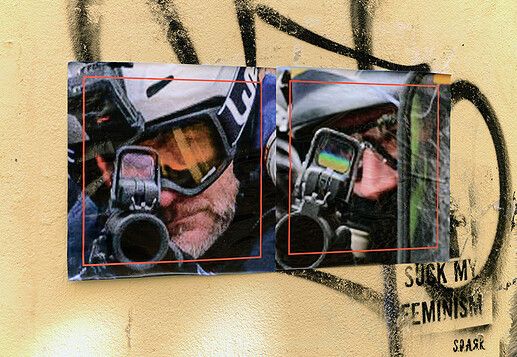Paolo Cirio is one of my favorite artists – I saw some of his work at Ars Electronica a few years ago. His latest project (late 2020) is called Capture, and works like this.
-
First, the artist collected 1,000 photos of public protests in France.
-
Next, he zoomed and cropped the faces of police officers in those photos.
-
Third, he printed out these photos and stealthily stuck them up on the walls of Paris.
-
Fourth, he ran facial recognition software on the photos. Hold this in your head, it is important.
-
Fifth, he created a website where people could identify police officers: they were served pictures, and could enter a name.
The project turned out to be… explosive.
- The police’s trade unions protested, as Capture was “putting officers at risk”.
- The Minister of the Interior, Gérald Darmanin, tweeted his disapproval.
- An exhibition of Capture scheduled to happen at Le Fresnoy, was canceled as the controversy mounted. Note: Le Fresnoy is in a city called Tourcoing, and Darmanin used to be the mayor of Tourcoing, stepping down during the preparation of the exhibition. Le Fresnoy denies receiving any outside pressure.
- Cirio left France altogether to avoid “retaliation”.
Now, if you are like me, you’ll be thinking: wait, what does it even mean for an artist to “run facial recognition software” on a photo? It’s not like Cirio, or any of us, is sitting on a dataset with identified picture of everyone in France. In the absence of such a dataset, even the best facial recognition software is going to draw a blank, every single time.
And, well: this is why Cirio is a famous artist, and I am not. The reactions of the representatives of the police has been one of disgust, like they had been contaminated by something filthy: someone had somehow grabbed their photos, and run them through facial recognition software! They had been violated! Rationally, this is nonsense, but emotionally it is very powerful, and therein lies Cirio’s artistic gesture. Capture shows us the instinctive loathing and disgust of humans when been intruded upon, when people are looking at you and you were not ready for it. We want to own the image we project.
Thanks to this work, I learned the extent to which facial recognition is already out there in Europe. And, like Cirio says, it’s unevenly distributed: the police can hide as they use violence, but for ordinary citizens the camera is always on. France is one of the European countries where its usage is most widespread. In this 8 minutes video, French Internet lawyers call for an outright ban on facial recognition technology. This is also Cirio’s position – he even engaged the European Commission on this (and the Commission promised to look into it).
It seems that now the Commission gets to walk the talk, because Commission VP Margrethe Vestager is participating in the Us-EU Trade & Technology Council, and the Reclaim Your Face campaign is pushing for a blanket ban to biometric surveillance. We’ll see how that pans out.
Anyway. FWIW I highly recommend Capture. Here is a short presentation video made by the artist:

